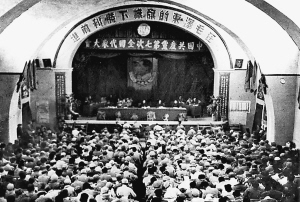More languages
More actions

The 7th National Congress of the Communist Party of China (中国共产党第七次全国代表大会) was held in Yan'an from April 23 to June 11, 1945. A total of 755 representatives attended the Seventh National Congress, including 547 official representatives and 208 alternate representatives, representing the 1.21 million party members of the whole party. Among the representatives, the oldest is nearly 70 years old, and the youngest is only about 20 years old.[1]
Opening
On April 23, in the Yangjialing Central Auditorium in Yan'an, on the rostrum of the opening ceremony of the Seventh National Congress, huge portraits of Mao Zedong and Zhu De were hung, and bright party flags were hung on both sides. On the wall behind the venue, there are four big characters of "One heart and one mind". Slogans such as "Uphold the Truth" and "Correct Mistakes" are posted on the walls on both sides, and 24 red flags are planted against the wall, symbolizing the 24-year struggle of the Communist Party of China. The "V"-shaped wooden seat with the red flag is a symbol of the victory of the revolution. Right above the rostrum, hung an eye-catching banner: "March forward victoriously under Mao Zedong's banner!" When Mao Zedong, Zhu De, Liu Shaoqi, Zhou Enlai, Ren Bishi and others appeared on the rostrum, all the representatives stood up, Applause. In the solemn "Internationale", Ren Bishi, secretary-general of the conference, announced the opening of the Seventh National Congress of the Communist Party of China, and Mao Zedong's opening speech to "The Destiny of Two Chinas".[1]
Reports
Mao Zedong submitted a written political report "On Coalition Government" to the Congress, and made a lengthy oral report on some of the issues in the report and others. Zhu De made the military report "On the Battlefields in the Liberated Areas" and concluded on discussing military issues, Liu Shaoqi made "Report on Revising the Party Constitution" and concluded on discussing organizational issues, and Zhou Enlai made an important speech "On the United Front". The conference fully promoted democracy, and conducted serious and in-depth discussions on important reports, especially Mao Zedong's political report, which was discussed and revised nine times. The original schedule of the Seventh National Congress of the Communist Party of China was relatively short. After the conference started, delegates asked for an extension one after another: Liu Bocheng, Peng Zhen, Nie Rongzhen, Lu Dingyi, Ulanfu, Bogu, Gao Gang, etc.[1]
Measures Passed
Their speeches were generally welcomed by the conference. After in-depth discussions, the congress unanimously adopted reports on politics, military affairs, and organization, as well as political resolutions, military resolutions, and a new party constitution.[1]
Election Results
The Congress elected a new Central Committee and a central leadership body. Among them, there are 44 members of the Central Committee and 33 alternate members of the Central Committee. The subsequent First Plenary Session of the Seventh Central Committee elected Mao Zedong, Zhu De, Liu Shaoqi, Zhou Enlai, Ren Bishi, Chen Yun, Kang Sheng, Gao Gang, Peng Zhen, Dong Biwu, Lin Boqu, Zhang Wentian, and Peng Dehuai as members of the Political Bureau of the Central Committee; elected Mao Zedong, Zhu De, Liu Shaoqi, Zhou Enlai and Ren Bishi were the secretaries of the Central Secretariat; Mao Zedong was elected as the chairman of the Central Committee and the Political Bureau of the Central Committee. Ren Bishi was elected as the Secretary-General of the Central Committee and Li Fuchun as the Deputy Secretary-General.[2]
Closing
On June 11, 1945, the conference held a grand closing ceremony. Mao Zedong delivered a closing speech. 'We had a very good congress,' he said, 'we had a victorious congress, a united congress.' , overcome all difficulties, and strive for victory.” After the meeting, Mao Zedong’s closing speech was edited and titled “The Foolish Old Man Who Removed the Mountains”, and it was included in the third volume of “Selected Works of Mao Zedong” and became a classic of Marxism-Leninism and Mao Zedong Thought.[2]
Outcome
The Seventh National Congress is an extremely important and last congress of the Communist Party of China during the period of the New Democratic Revolution. It sums up the historical experience of more than 20 years of tortuous development of China's new democratic revolution, formulates correct lines, programs and strategies, overcomes erroneous ideas within the party, and enables the whole party, especially senior party cadres, to understand the law of development of China's democratic revolution. A relatively clear understanding has been achieved, so that the whole party has achieved unprecedented unity on the basis of Marxism-Leninism and Mao Zedong Thought. This meeting will be recorded in the annals of history as 'a meeting of unity and a meeting of victory'. It has laid a deep political, ideological and organizational foundation for the party to lead the people to win the victory of the War of Resistance Against Japan and the victory of the new democratic revolution in the whole country.[2] Another major historic contribution of the Seventh National Congress of the Communist Party of China was to write Mao Zedong Thought on the Party's banner, establish Mao Zedong Thought as the Party's guiding ideology and write it into the Party Constitution. After the Seventh National Congress, under the guidance of Mao Zedong Thought, the comrades of the whole party united as one and worked hard to advance the historical process of the Chinese revolution, and finally won the great historical victory of the new democratic revolution in 1949.[3]
- ↑ 1.0 1.1 1.2 1.3 "Introduction to the Seventh National Congress of the Communist Party of China". People's Daily Online.
- ↑ 2.0 2.1 2.2 "Introduction to the Seventh National Congress of the Communist Party of China 2". People's Daily Online. Archived from the original on 2016-04-08. Retrieved 2023-04-03.
- ↑ "Introduction to the Seventh National Congress of the Communist Party of China 3". People's Daily Online. Archived from the original on 2016-04-20. Retrieved 2023-04-03.
